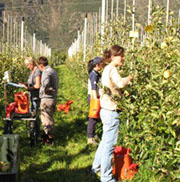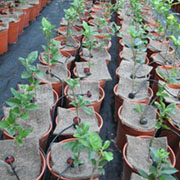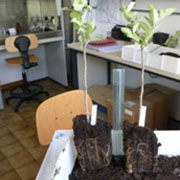BIO-INCROP



More about the project
Main results and conclusions
APPLE
- Apple replant disease in central Europe has a consistent biotic origin which is responsible for about 30% of growth reduction in multi-generation orchards. Cylindrocarpon-like fungi and Pythium spp. were shown to be primarily responsible for plant growth reduction, which was confirmed as main indicator of apple replant disease.
- Pyrosequencing analysis of rhizospheric microbial communities associated to replanted orchards confirmed that Cylindrocarpon-like fungi are largely associated to replant disease; however, it also evidenced that several bacterial and fungal genera indigenous to replanted orchards are positively correlated to plant growth. This suggested that many are the indigenous resource to be exploited for increasing plant growth/soil health in permanent cropping systems.
- Pre-plant treatment with locally available composts of different origin showed a variable effect in plant growth. Composted mushroom substrate gave the best performance in four countries involved in the evaluation. The phytotoxicity effect, due to high salt content in composts, represents a limit that can be overcome by setting up suitable amendment doses.
- Cover crops in pre-plant can induce microbial changes at the rhizosphere level of the subsequent apple orchards, despite soil microbial resilience due to long-term management of soil. However, one only pre-plant break with cover crop is not sufficient to mitigate replant disease in the subsequent newly planted trees.
- Commercially available bio-formulates in each country involved in the project and selected for their common ingredients (Trichoderma spp., Bacillus, Paecilomyces and 5 of 38 other strain active in biocontrol) did not result overall effective in reducing common apple replant disease, although two specific products out of ten selected in all cases gave the highest plant growth. To the contrary, two out of ten bio-formulates were effective in controlling Phytophthora cactorum attack.
- Among the non-chemical options tested for reducing replant problems, soil steam application in pre-plant gave promising results after one-year field trials.
CITRUS
- Phytophthora citrophtora was mainly responsible for citrus degradation in Mediterranean countries. A study on conversion to organic cultivation performed in a large degraded citrus orchards in Valencia province (Spain) gave 25% of plants dead for Phytophthora attack within 2-year after transplant.
- Growth response of newly planted trees to different soil management (including solarisation, cover crops and organic amendments) and the application of ten commercially available bioformulates (biofungicides, nematocides and biostimulants and active principles) in degraded citrus orchards was not significantly affected by any preplant treatments.
- Techniques based on the application of organic matter shortly before replanting are not successful in total control of Phytophthora attack in citrus degraded orchards, but do reduce damage to soil organic matter and biological activity compared to more aggressive techniques such as solarisation. Vegetal covers appear to be very promising in this respect as they cause a large stimulation of biological activity in soil when applied to degraded orchards.
- Soil enzymes were shown to be very useful indicators of changes in soil quality when converting degraded citrus to organic management in Mediterranean environment
- Phytophthora citrophtora severity attack was successfully reduced by several bioformulates commercially available in Turkey (especially those with Lactobacillus acidophilus and biologically active principles as their main ingredients) in controlled conditions using citrus rootstocks. However, findings of the project overall showed that, origin, type and condition of the replant soil strongly affect the effectiveness of the biological active formulate in controlling Phytophthora attack in newly planted citrus trees.
BIO-INCROP
Coordinator
Senior Scientist Luisa Maria Manici, Agricultural Research Council, Italy
Partners
Head of Department Markus Kelderer, Laimburg Research Centre for Agriculture and Foresty, Italy
Colaborador Científico Adjunto Rodolfo Canet, Instituto Valenciano de Investigaciones Agrarias, Spain
Manager Gerhard Baab, DLR Rheinpfalz, Center of competence, Germany
Researcher Thomas Rühmer, Landwirtschaftliches Versuchszentrum Graz-Haidegg, Austria
Researcher Ingrid Whittle, University of Innsbruch, Austria
PhD Andraes Naef, Agroscope Changins-Wädenswil Research Station, Switzerland
Dr. Suat Kaymak, GDAR, Plant Protection Central Research Institute, Ankara, Turkey
Dr. PINAR Hasan Alata Horticulture Research Station, Mersin, Turkey
Project stakeholders
Target groups of the project are:
- Organic Growers and Organic farmers associations
- Regional, National and European committees involved in setting guidelines in organic farming
- Students and Researchers
- Consumers

